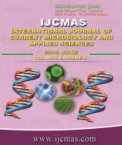


 National Academy of Agricultural Sciences (NAAS)
National Academy of Agricultural Sciences (NAAS)

|
PRINT ISSN : 2319-7692
Online ISSN : 2319-7706 Issues : 12 per year Publisher : Excellent Publishers Email : editorijcmas@gmail.com / submit@ijcmas.com Editor-in-chief: Dr.M.Prakash Index Copernicus ICV 2018: 95.39 NAAS RATING 2020: 5.38 |
Indigenous knowledge (IK), which is variously referred to as ‘traditional knowledge’, ‘local knowledge’, ‘folk knowledge’ etc., refers to that body of knowledge developed by local and indigenous communities over time in response to the needs of their specific local environment. This indigenous knowledge is really important in conserving the biological resources existing in different altitudinal and climatic variations. The indigenous communities of Kanyakumari use thirty plant species belonging to 29 genera and 22 families specifically in the treatment of various skin diseases viz., dandruff, eczema, impetigo, leprosy, rash, scabies etc. Saraca asoca plant becomes vulnerable since it is frequently used for the treatment of scabies. The local people of Uttarakhand, Dev Bhoomi (Land of God), performes so many rituals on which so many plants have important roles like Ficus religiosa, Azadirachta indica, Ocimun sanctum, Centella asiatica, Curcuma longa, Cynodon dactylon etc. Other than that 19 plants species have been identified can be used for religious as well as medicinal purposes are Aegle marmelos, Artemisia nilagirica, Capsicum annum, Cedrus deodara, Curcuma longa, Cynodon dactylon, Euphorbia ligularia, Mangifera indica, Musa paradisiaca, Ocimum sanctum, Piper betle, Tagetes erecta, Urtica dioica, Zanthoxylum aromatum etc. The diverse indigenous knowledge existing in our country largely affects the sustainability of the local people in favour of environment but, due to globalization these indigenous knowledge is in the verge of extinction. Hence there is real urgency to preserve this unique indigenous knowledge and biodiversities through implementation of the policies and modern technologies and skills for sustainable development of the country. The full paper discussed different applications of diversified plant based indigenous knowledge and their conservation to achieve sustainability.
 |
 |
 |
 |
 |